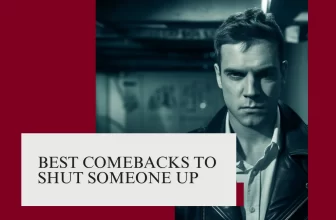We’ve all been there, right? You’re in the middle of a conversation, maybe trying to make a point or share something important, and then BAM someone hits you with “I don’t care.”
It can be super frustrating and even a little hurtful, especially when you’re putting yourself out there. But don’t worry, I’ve got your back! 💪
If you’re stuck on how to respond, I’ve put together some of the best comebacks that’ll help you handle the situation with confidence and maybe even keep the conversation going in a positive direction.
Whether it’s with a friend, a partner, or someone you just met, these responses will help you navigate that tricky “I don’t care” moment with ease.
Let’s dive in! 🌊
27 Best Comebacks to “I Don’t Care”
1. “That’s okay, I do.”
Short, sweet, and to the point! Sometimes, the best way to handle “I don’t care” is by calmly letting them know that you care. It shows that you’re not letting their indifference get to you, and you’re still invested in the conversation.
2. “Well, I care enough for the both of us.”
This one’s a little cheeky 😏 but still respectful. It’s a fun way to say, “Hey, I’m here, and I’m still going to talk about this because it matters to me.”
3. “I’m sorry you feel that way, but this is important to me.”
This response is perfect when you want to keep things calm and sincere. You’re acknowledging their feelings but also standing your ground and showing that the topic is something you care about.
4. “You might not care now, but it’s worth considering.”
Sometimes, people say “I don’t care” in the heat of the moment. This comeback gently suggests that while they might not care right now, the topic could be important later. It’s all about planting the seed 🌱 for future consideration.
5. “That’s cool, but let’s not ignore it just yet.”
If you want to keep the conversation going without escalating things, this is a great way to do it. It’s casual and non-confrontational, but it still keeps the door open for more discussion.
6. “I get it, but hear me out for a sec.”
Sometimes, all you need is a little more time to explain yourself. This comeback is super simple and asks for just a moment more of their attention. Most people will give you that much, and who knows—you might even change their mind! 😉
7. “That’s fair, but let me tell you why it matters to me.”
This one’s all about building empathy. By sharing why the topic is important to you, you might help them see things from your perspective. Plus, it keeps the conversation respectful and open.
8. “I hear you, but this is something I can’t just brush off.”
When something really matters to you, it’s okay to say so! This response is firm but still respectful, letting them know that while you understand their position, the topic is something you need to talk about.
9. “Maybe not right now, but I think this could be important later.”
This is a gentle way to suggest that the issue might be worth revisiting. It’s not pushy, but it does leave the door open for future conversations. 🌟
10. “That’s alright. I just wanted to share my thoughts with you.”
Sometimes, people just need to know that you’re sharing because it’s important to you, not because you’re expecting a certain reaction. This response is low-pressure and helps keep things light.
11. “You’re entitled to your opinion, but I think this deserves a bit more attention.”
Here’s a way to acknowledge their feelings while also standing by your own. It’s a great balance between being assertive and respectful.
12. “I get where you’re coming from, but I still think it’s worth talking about.”
This one’s perfect for when you understand their point of view but believe the conversation has more to offer. It’s a way of saying, “Let’s keep going, even if we don’t agree.”
13. “I respect that, but I’d appreciate if we could at least consider it.”
If you’re looking to keep things polite and considerate, this is a solid option. It asks for a little more thought without demanding it, which can help keep the conversation moving.
14. “That’s okay, but can I ask why?”
When in doubt, ask questions! This response invites them to explain why they don’t care, which can lead to a deeper conversation. Plus, it shows that you’re genuinely interested in understanding their perspective.
15. “I understand, but let’s not dismiss it just yet.”
This comeback is all about keeping the conversation open. It’s gentle but firm, encouraging them not to shut down the discussion too quickly.
16. “Fair enough, but you might care once you hear the full story.”
This comeback is great for piquing their interest. It suggests there’s more to the conversation that they might find engaging, without being too pushy.
17. “Well, I’m still going to tell you because I value your opinion.”
This response is both flattering and assertive. It lets them know that you care about what they think, even if they’re not particularly interested at the moment.
18. “I hear you, but can I at least share my side? It might change your mind.”
This one’s a little more persuasive, suggesting that they might see things differently after hearing what you have to say. It’s respectful and opens the door for further discussion.
19. “I get it, but maybe we can talk about it later when it’s more relevant?”
If now isn’t the right time, this response is a great way to suggest putting a pin in the conversation and revisiting it later when they might be more receptive.
20. “Totally understand, but I’d still love to get your thoughts on it.”
This is a gentle nudge that shows you value their input, even if they’re not super interested right now. It’s a nice way to keep them engaged without being too forceful.
21. “Okay, no worries. Let’s talk about something you do care about!”
If the conversation isn’t going anywhere, sometimes it’s best to pivot. This comeback is light-hearted and shows that you’re willing to switch gears to something more engaging for them.
22. “That’s cool, but it’s kind of important to me. Can we at least touch on it?”
Here’s a more direct approach that still respects their feelings while emphasizing the importance of the topic to you. It’s a good way to find common ground.
23. “I get it, but it’s something I can’t just ignore. Can we talk it through?”
This response is firm but fair, showing that while you understand their position, the issue is still something you need to address. It keeps the conversation respectful and focused.
24. “No worries, but I’m still going to share. You might find it more interesting than you think!”
This is a fun and confident response that lightly challenges their disinterest. It’s a way to keep the conversation going without putting too much pressure on them.
25. “Alright, but just so you know, it’s kind of important to me.”
Sometimes, the best way to respond is by being honest and upfront about your feelings. This comeback lets them know that while they might not care, it matters to you.
26. “That’s okay, but I think it’s worth a quick chat. You in?”
Here’s a way to suggest continuing the conversation without making it feel like a big deal. It’s casual and invites them to stay engaged in a low-pressure way.
27. “I understand, but I’d appreciate it if we could at least consider it. It won’t take long.”
This response is polite and asks for just a little more of their time. It’s a respectful way to keep the discussion alive without making them feel cornered.
Responding to “I don’t care” doesn’t have to be a conversation killer. With the right approach, you can keep things respectful, engaging, and maybe even a little fun. Whether you’re aiming to keep the dialogue open or gently steer things back on track, these comebacks will help you navigate the situation with confidence and ease.
Final Thoughts: Handling “I Don’t Care” with Confidence
Getting hit with an “I don’t care” can be a bit of a curveball, but it doesn’t have to derail the conversation. The key is to stay calm, be respectful, and keep the dialogue open.
These comebacks are here to help you navigate those moments with confidence and maybe even turn things around for the better.
Remember, it’s all about balance, standing your ground while still being understanding. And hey, don’t be afraid to throw in a smiley or a wink 😉 if it feels right.
A little light-heartedness can go a long way!
So next time someone drops an “I don’t care” on you, you’ll be ready with a response that keeps things positive and moving forward. You’ve got this! 💪






